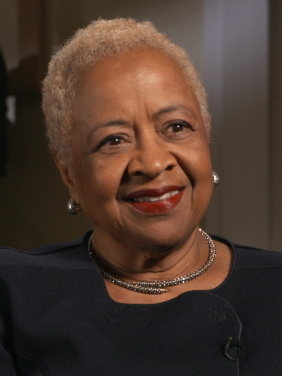Richard B. Lippin Lecture in Ethics
Focusing on current ethical issues in the fields of business, medicine, science, and technology, and questions of justice, the annual Richard B. Lippin Lecture in Ethics features the latest perspectives and work from public intellectuals. Since its inception, the Lippin Lecture has presented such notable people as Bryan Stevenson, Salman Rushdie, Melanie Killen, and Sue Knight, MD.
The Lippin Lecture is made possible by support from Richard B. (Dick) Lippin and the late Ronnie Lippin. Dick Lippin is a 1968 psychology graduate of Penn State who established the lectureship with his late wife because he felt that much of the integrity and honesty that he knew growing up was now lacking in the world of business. His company, the Los Angeles-based Lippin Group, does marketing consulting for the entertainment industry.
Upcoming Lecture:
The Sum of Us
Be a part of a conversation that shapes a better tomorrow.
Dive into the heart of America’s economic challenges and its failures to serve the public. From the surge in student debt to the crumbling state of public infrastructure, one common thread exists, embedded racism in our politics and policymaking that affects us all.
Heather McGhee will unveil the detrimental impact of the zero-sum paradigm—the notion that progress for some must come at the expense of others. We’ll discover the Solidarity Dividend—the benefits we all reap when diverse communities come together to achieve what is impossible alone.
Heather McGhee
Heather designs and promotes solutions to inequality in America. Over her career in public policy, Heather has crafted legislation, testified before Congress and helped shape presidential campaign platforms. Her book The Sum of Us: What Racism Costs Everyone and How We Can Prosper Together spent 10 weeks on the New York Times bestseller list and was longlisted for the National Book Award and Carnegie Medal for Excellence in Nonfiction. The New York Times called it, “The book that should change how progressives talk about race.” and the Chicago Tribune said, “Required reading to move the country forward…”. It is a Washington Post and TIME Magazine Must-Read Book of 2021. The paperback version was released in February 2022 and the book was adapted into a Spotify podcast by Higher Ground, the production company of Barack and Michelle Obama in June 2022. A young adult readers’ version of The Sum of Us was released by Random House Children’s in 2023 and was selected as a Best Teen and Young Adult Non-Fiction book of that year by Kirkus Reviews.
Heather is an educator and most recently served as a Distinguished Visiting Lecturer in Urban Studies at the City University of New York’s School of Labor and Urban Studies. She has also held visiting positions at Yale University’s Brady-Johnson Grand Strategy Program and the University of Chicago’s Institute of Politics. She is the recipient of honorary degrees from Muhlenberg College, Niagara University, and CUNY Graduate School of Public Health & Health Policy.
For nearly two decades, Heather helped build the non-partisan “think and do” tank Demos, serving four years as president. Under McGhee’s leadership, Demos moved their original idea for “debt-free college” into the center of the 2016 presidential debate, argued before the Supreme Court to protect voting rights in January 2018, helped win pro-voter reforms in five states over two years, provided expert testimony to Congressional committees, including a Supreme Court confirmation hearing in 2017, and led the research campaigns behind successful wage increases for low-paid workers on federal contracts, as well as at McDonalds, Walmart and other chain retailers.
As an executive, McGhee transformed Demos on multiple levels. She led a successful strategic planning and rebranding process. She designed a Racial Equity Organizational Transformation which led to an increase in staff racial diversity (from 27 percent people of color to 60 percent in four years), an original racial equity curriculum for staff professional development and a complete overhaul of the organization’s research, litigation and campaign strategies using a racial equity lens. McGhee also nearly doubled the organizational budget in four years. A strong coalition-builder and trusted cross-movement leader, McGhee deepened Demos’ influence through new networks and collaborations inside and outside the Beltway.
An influential voice in the media and a former NBC contributor, McGhee regularly appears on NBC’s Meet the Press and MSNBC’s Morning Joe, Deadline White House and All In. Her 2020 TED talk is entitled “Racism Has a Cost for Everyone”. She has shared her opinions, writing and research in numerous outlets, including the Washington Post, New York Times, Wall Street Journal, USA Today, Politico and National Public Radio. McGhee’s conversation on a CSPAN program in 2016 with a white man who asked for her help to overcome his racial prejudice went viral, receiving more than 10 million views and sparking wide media coverage that included a New York Times op-ed, a New Yorker piece and a CNN town hall. In spring 2018, Starbucks founder Howard Schultz asked McGhee to advise the company as it designed an anti-bias training for 250,000 employees in the wake of the unjust arrest of two black men in a Philadelphia store. McGhee wrote a report with recommendations for how Starbucks can apply a racial equity lens to their businesses, and how other companies both large and small can benefit from doing the same.
McGhee also played a leadership role in steering the historic Dodd-Frank Wall Street Reform and Consumer Protection Act, and was one of the key advocates credited for the adoption of the Volcker Rule. She holds a B.A. in American Studies from Yale University and a J.D. from the University of California at Berkeley School of Law,. McGhee is the chair of the board of Color Of Change, the nation’s largest online racial justice organization, and also serves on the boards of the Rockefeller Brothers Fund, the Open Society Foundations’ US Programs and Demos.
For more information, please visit www.heathermcghee.com and follow Heather on Twitter: @hmcghee and Instagram and Facebook: @HeatherCMcGhee
Resources to learn more about McGhee and her work:
- TED Talk “Racism Has a Cost for Everyone”
- Fresh Air interview of McGhee on NPR
- Daily Show interview of McGhee
- New York Times review of The Sum of Us
- More on the book The Sum of Us
- Young readers edition of The Sum of Us
Event co-sponsors:
- University Park Allocation Committee
- Rock Ethics Institute
- The McCourtney Institute for Democracy
- Office of the Vice Provost for Educational Equity
- College of Education
- College of Earth and Mineral Sciences
- Smeal College of Business
- Department of African American Studies
- Department of Philosophy
- Department of Sociology and Criminology
- Humanities Institute
- Paul Robeson Cultural Center
- Penn State Outreach
- Paterno Fellows Program
- Public Policy Association
- Department of Women’s, Gender, and Sexuality Studies
Past Lectures:
The Sum of Us
Be a part of a conversation that shapes a better tomorrow.
Dive into the heart of America’s economic challenges and its failures to serve the public. From the surge in student debt to the crumbling state of public infrastructure, one common thread exists, embedded racism in our politics and policymaking that affects us all.
Heather McGhee will unveil the detrimental impact of the zero-sum paradigm—the notion that progress for some must come at the expense of others. We’ll discover the Solidarity Dividend—the benefits we all reap when diverse communities come together to achieve what is impossible alone.
Heather McGhee
Heather designs and promotes solutions to inequality in America. Over her career in public policy, Heather has crafted legislation, testified before Congress and helped shape presidential campaign platforms. Her book The Sum of Us: What Racism Costs Everyone and How We Can Prosper Together spent 10 weeks on the New York Times bestseller list and was longlisted for the National Book Award and Carnegie Medal for Excellence in Nonfiction. The New York Times called it, “The book that should change how progressives talk about race.” and the Chicago Tribune said, “Required reading to move the country forward…”. It is a Washington Post and TIME Magazine Must-Read Book of 2021. The paperback version was released in February 2022 and the book was adapted into a Spotify podcast by Higher Ground, the production company of Barack and Michelle Obama in June 2022. A young adult readers’ version of The Sum of Us was released by Random House Children’s in 2023 and was selected as a Best Teen and Young Adult Non-Fiction book of that year by Kirkus Reviews.
Heather is an educator and most recently served as a Distinguished Visiting Lecturer in Urban Studies at the City University of New York’s School of Labor and Urban Studies. She has also held visiting positions at Yale University’s Brady-Johnson Grand Strategy Program and the University of Chicago’s Institute of Politics. She is the recipient of honorary degrees from Muhlenberg College, Niagara University, and CUNY Graduate School of Public Health & Health Policy.
For nearly two decades, Heather helped build the non-partisan “think and do” tank Demos, serving four years as president. Under McGhee’s leadership, Demos moved their original idea for “debt-free college” into the center of the 2016 presidential debate, argued before the Supreme Court to protect voting rights in January 2018, helped win pro-voter reforms in five states over two years, provided expert testimony to Congressional committees, including a Supreme Court confirmation hearing in 2017, and led the research campaigns behind successful wage increases for low-paid workers on federal contracts, as well as at McDonalds, Walmart and other chain retailers.
As an executive, McGhee transformed Demos on multiple levels. She led a successful strategic planning and rebranding process. She designed a Racial Equity Organizational Transformation which led to an increase in staff racial diversity (from 27 percent people of color to 60 percent in four years), an original racial equity curriculum for staff professional development and a complete overhaul of the organization’s research, litigation and campaign strategies using a racial equity lens. McGhee also nearly doubled the organizational budget in four years. A strong coalition-builder and trusted cross-movement leader, McGhee deepened Demos’ influence through new networks and collaborations inside and outside the Beltway.
An influential voice in the media and a former NBC contributor, McGhee regularly appears on NBC’s Meet the Press and MSNBC’s Morning Joe, Deadline White House and All In. Her 2020 TED talk is entitled “Racism Has a Cost for Everyone”. She has shared her opinions, writing and research in numerous outlets, including the Washington Post, New York Times, Wall Street Journal, USA Today, Politico and National Public Radio. McGhee’s conversation on a CSPAN program in 2016 with a white man who asked for her help to overcome his racial prejudice went viral, receiving more than 10 million views and sparking wide media coverage that included a New York Times op-ed, a New Yorker piece and a CNN town hall. In spring 2018, Starbucks founder Howard Schultz asked McGhee to advise the company as it designed an anti-bias training for 250,000 employees in the wake of the unjust arrest of two black men in a Philadelphia store. McGhee wrote a report with recommendations for how Starbucks can apply a racial equity lens to their businesses, and how other companies both large and small can benefit from doing the same.
McGhee also played a leadership role in steering the historic Dodd-Frank Wall Street Reform and Consumer Protection Act, and was one of the key advocates credited for the adoption of the Volcker Rule. She holds a B.A. in American Studies from Yale University and a J.D. from the University of California at Berkeley School of Law,. McGhee is the chair of the board of Color Of Change, the nation’s largest online racial justice organization, and also serves on the boards of the Rockefeller Brothers Fund, the Open Society Foundations’ US Programs and Demos.
For more information, please visit www.heathermcghee.com and follow Heather on Twitter: @hmcghee and Instagram and Facebook: @HeatherCMcGhee
Resources to learn more about McGhee and her work:
- TED Talk “Racism Has a Cost for Everyone”
- Fresh Air interview of McGhee on NPR
- Daily Show interview of McGhee
- New York Times review of The Sum of Us
- More on the book The Sum of Us
- Young readers edition of The Sum of Us
Event co-sponsors:
- University Park Allocation Committee
- Rock Ethics Institute
- The McCourtney Institute for Democracy
- Office of the Vice Provost for Educational Equity
- College of Education
- College of Earth and Mineral Sciences
- Smeal College of Business
- Department of African American Studies
- Department of Philosophy
- Department of Sociology and Criminology
- Humanities Institute
- Paul Robeson Cultural Center
- Penn State Outreach
- Paterno Fellows Program
- Public Policy Association
- Department of Women’s, Gender, and Sexuality Studies
By Hands Now Known: Jim Crow’s Legal Executioners
The 2023 Richard B. Lippin Lecture in Ethics will feature Margaret Burnham, Professor of Law and Founding Director of the Civil Rights and Restorative Justice Project at Northeastern University. In this lecture, co-hosted by African American Studies and the Rock Ethics Institute, Professor Burnham will discuss her new book By Hands Now Known: Jim Crow’s Legal Executioners — a paradigm-shifting investigation of Jim Crow-era violence, the legal apparatus that sustained it, and its enduring legacy. The lecture will be Thursday, February 23, at 6:00pm in the Flex Theatre (HUB 132).
President Joe Biden recently appointed Professor Burnham to the Civil Rights Cold Case Records Review Board, which examines records related to cold cases of murder and other racially motivated violence that occurred between 1940 and 1979. She began her career at the NAACP Legal Defense and Educational Fund. In 1977, she became the first African American woman to serve in the Massachusetts judiciary when she joined the Boston Municipal Court bench as an associate justice. Later in 1993, South African president Nelson Mandela appointed Professor Burnham to serve on an international human rights commission to investigate alleged human rights violations within the African National Congress. The commission was a precursor to the Truth and Reconciliation Commission.
To learn more about Professor Burnham and her research into racial violence, listen to her interview on NPR’s Fresh Air and read the New York Times‘ review of By Hands Now Known.
2022 Richard B. Lippin Lecture in Ethics
Katrina Karkazis is a cultural anthropologist working at the intersection of science and technology studies, theories of gender and race, social studies of medicine, and bioethics. Karkazis’ research and teaching examine—and challenge—scientific and medical beliefs about gender, sexuality, and the body across a range of topics. Karkazis is Professor of Sexuality, Women’s, and Gender Studies at Amherst College and a Senior Research Fellow with the Global Health Justice Partnership at Yale University. She previously held appointments at Stanford University and as the Carol Zicklin Chair in the Honors Academy at Brooklyn College, CUNY. She has also served as a Visiting Professor at Emory University.
Professor Karkazis’ latest book, Testosterone: An Unauthorized Biography, written with Rebecca Jordan-Young and published by Harvard University Press, unsettles a great deal of long-standing knowledge and beliefs about this hormone. Testosterone was awarded the Gold Medal in Science from the Independent Publisher Book Awards. This work was supported by the National Science Foundation and the Brocher Foundation, as well as a Guggenheim Fellowship and an American Council of Learned Societies Research Fellowship. A recent essay, “The Masculine Mystique of T,” was published in the New York Review of Books.
Karkazis’ work on testosterone stems from her earlier research, including research on “sex testing” and sport regulations that ban women athletes with naturally high testosterone. This research has appeared in Science, The American Journal of Bioethics, BMJ, and Feminist Formations. She contributed to Dutee Chand’s successful appeal of the IAAF’s testosterone regulation at the Court of Arbitration for Sport (CAS) and served as an expert witness in the hearing. She also consulted with Caster Semenya’s team prior to her CAS hearing. Karkazis has also contributed the Report of UN High Commissioner for Human Rights, Intersection of race and gender discrimination in sport (June 2020) and the Human Rights Watch Report, “They’re Chasing Us Away from Sport”: Human Rights Violations in Sex Testing of Elite Women Athletes (December 2020).
Karkazis began her career looking at controversies over treatment for people with intersex traits, which resulted in the book, Fixing Sex: Intersex, Medical Authority, and Lived Experience (Duke 2008). Fixing Sex was a finalist for Lambda Literary Award in 2009 and a nominee for the Margaret Mead Award in 2010.
Karkazis’ writing has appeared in the New York Times, The Guardian, Wired, and the New York Review of Books, among other outlets.
Karkazis’ research has been covered in the New York Times, Time, BuzzFeed, The Week, CNN, ESPN, The Daily Beast, The Los Angeles Times, Boston Globe, Jezebel, Slate, The Advocate, La Liberation, The Chronicle of Higher Education, San Jose Mercury News, and the Toronto Star. She has also appeared on The World, BBC, CBS News, NBC News, KCBS, CTV News, Q Radio, Al Jazeera, and the Australian Broadcasting Corporation, among others.
Katrina Karkazis holds a doctorate in Cultural Anthropology and a Master’s in Public Health, both from Columbia University.
Automating Inequality
Noted author Virginia Eubanks presented the Rock Ethics Institute’s 2020 Richard B. Lippin Lecture in Ethics the evening of October 1, 2020. In her lecture, Eubanks expanded on the themes of her book “Automating Inequality: How High-Tech Tools Profile, Police, and Punish the Poor,” which investigates the impacts of data mining, policy algorithms, and predictive risk models on poor and working-class people in America.
She was joined for a panel discussion after the talk by Sarah Rajtmajer (research associate in the Rock Ethics Institute and assistant professor of information sciences and technology) and Pamela VanHaitsma (Sherwin Early Career Professor in the Rock Ethics Institute and assistant professor of communication arts and sciences and women’s, gender, and sexuality studies, and interim director of Center for Humanities and Information). The event was moderated by Daniel Susser (research associate in the Rock Ethics Institute and assistant professor of information sciences and technology and philosophy).
Presented virtually, Eubank’s lecture and the panel discussion can be seen here.
“Automatic Inequality” received the 2018 McGannon Center Book Prize and was shortlisted for the Goddard Riverside Stephan Russo Book Prize for Social Justice.
Virginia Eubanks is an Associate Professor of Political Science at the University at Albany, SUNY. She is the author of Automating Inequality: How High-Tech Tools Profile, Police, and Punish the Poor; Digital Dead End: Fighting for Social Justice in the Information Age; and co-editor, with Alethia Jones, of Ain’t Gonna Let Nobody Turn Me Around: Forty Years of Movement Building with Barbara Smith. Her writing about technology and social justice has appeared in Scientific American, The Nation, Harper’s, and Wired. For two decades, Eubanks has worked in community technology and economic justice movements. She was a founding member of the Our Data Bodies Project and a 2016-2017 Fellow at New America. She lives in Troy, NY.
Co-sponsors for this year’s Lippin Lecture included the Center for Humanities and Information; the Donald P. Bellisario College of Communications; the McCourtney Institute for Democracy; and Penn State University Libraries. The McCourtney Institute interviewed Eubanks during a recent episode of its Democracy Works podcast.
An Evening with Bryan Stevenson
The Rock Ethics Institute’s 2019 Richard B. Lippin Lecture in Ethics featured award-winning author and lawyer Bryan Stevenson. Stevenson is the author of the New York Times bestseller Just Mercy and is one of the leading voices for civil rights and criminal justice reform in America today. His lecture explored what justice demands, both inside and outside the courtroom, and the need to address the legacy of racial violence and oppression in the United States.
Stevenson is the founder and executive director of the Equal Justice Initiative (EJI) in Montgomery, Alabama. Under his leadership, EJI has won significant legal challenges eliminating excessive and unfair sentencing, exonerating innocent death row prisoners, confronting the abuse of the incarcerated and the mentally ill, and aiding children prosecuted as adults. In April 2018, EJI opened a national memorial to victims of lynching, The National Memorial for Peace and Justice, as well as a companion museum, The Legacy Museum: From Enslavement to Mass Incarceration, built on the site of a former slave warehouse in downtown Montgomery.
For more information on Stevenson’s visit, the work of EJI, and Stevenson himself, please visit the following:
WPSU BookMark: “Just Mercy” By Bryan Stevenson
Bryan Stevenson shares a message of acceptance, reconciliation, and hope
Lawyer Bryan Stevenson discusses criminal justice reform, changing the world
‘Hope is your superpower’: Bryan Stevenson speaks at Penn State Abington
TED Talk: “We Need to Talk about an Injustice”
NYT: “A Memorial to the Lingering Horror of Lynching”
This event was sponsored by the Rock Ethics Institute, Student Programming Association, Office of the Vice Provost for Educational Equity, World Campus, McCourtney Institute for Democracy, Penn State Law, Adult Learner Programs & Services, and Center for Character, Conscience, and Public Purpose.
2022 Richard B. Lippin Lecture in Ethics
Katrina Karkazis is a cultural anthropologist working at the intersection of science and technology studies, theories of gender and race, social studies of medicine, and bioethics. Karkazis’ research and teaching examine—and challenge—scientific and medical beliefs about gender, sexuality, and the body across a range of topics. Karkazis is Professor of Sexuality, Women’s, and Gender Studies at Amherst College and a Senior Research Fellow with the Global Health Justice Partnership at Yale University. She previously held appointments at Stanford University and as the Carol Zicklin Chair in the Honors Academy at Brooklyn College, CUNY. She has also served as a Visiting Professor at Emory University.
Professor Karkazis’ latest book, Testosterone: An Unauthorized Biography, written with Rebecca Jordan-Young and published by Harvard University Press, unsettles a great deal of long-standing knowledge and beliefs about this hormone. Testosterone was awarded the Gold Medal in Science from the Independent Publisher Book Awards. This work was supported by the National Science Foundation and the Brocher Foundation, as well as a Guggenheim Fellowship and an American Council of Learned Societies Research Fellowship. A recent essay, “The Masculine Mystique of T,” was published in the New York Review of Books.
Karkazis’ work on testosterone stems from her earlier research, including research on “sex testing” and sport regulations that ban women athletes with naturally high testosterone. This research has appeared in Science, The American Journal of Bioethics, BMJ, and Feminist Formations. She contributed to Dutee Chand’s successful appeal of the IAAF’s testosterone regulation at the Court of Arbitration for Sport (CAS) and served as an expert witness in the hearing. She also consulted with Caster Semenya’s team prior to her CAS hearing. Karkazis has also contributed the Report of UN High Commissioner for Human Rights, Intersection of race and gender discrimination in sport (June 2020) and the Human Rights Watch Report, “They’re Chasing Us Away from Sport”: Human Rights Violations in Sex Testing of Elite Women Athletes (December 2020).
Karkazis began her career looking at controversies over treatment for people with intersex traits, which resulted in the book, Fixing Sex: Intersex, Medical Authority, and Lived Experience (Duke 2008). Fixing Sex was a finalist for Lambda Literary Award in 2009 and a nominee for the Margaret Mead Award in 2010.
Karkazis’ writing has appeared in the New York Times, The Guardian, Wired, and the New York Review of Books, among other outlets.
Karkazis’ research has been covered in the New York Times, Time, BuzzFeed, The Week, CNN, ESPN, The Daily Beast, The Los Angeles Times, Boston Globe, Jezebel, Slate, The Advocate, La Liberation, The Chronicle of Higher Education, San Jose Mercury News, and the Toronto Star. She has also appeared on The World, BBC, CBS News, NBC News, KCBS, CTV News, Q Radio, Al Jazeera, and the Australian Broadcasting Corporation, among others.
Katrina Karkazis holds a doctorate in Cultural Anthropology and a Master’s in Public Health, both from Columbia University.




